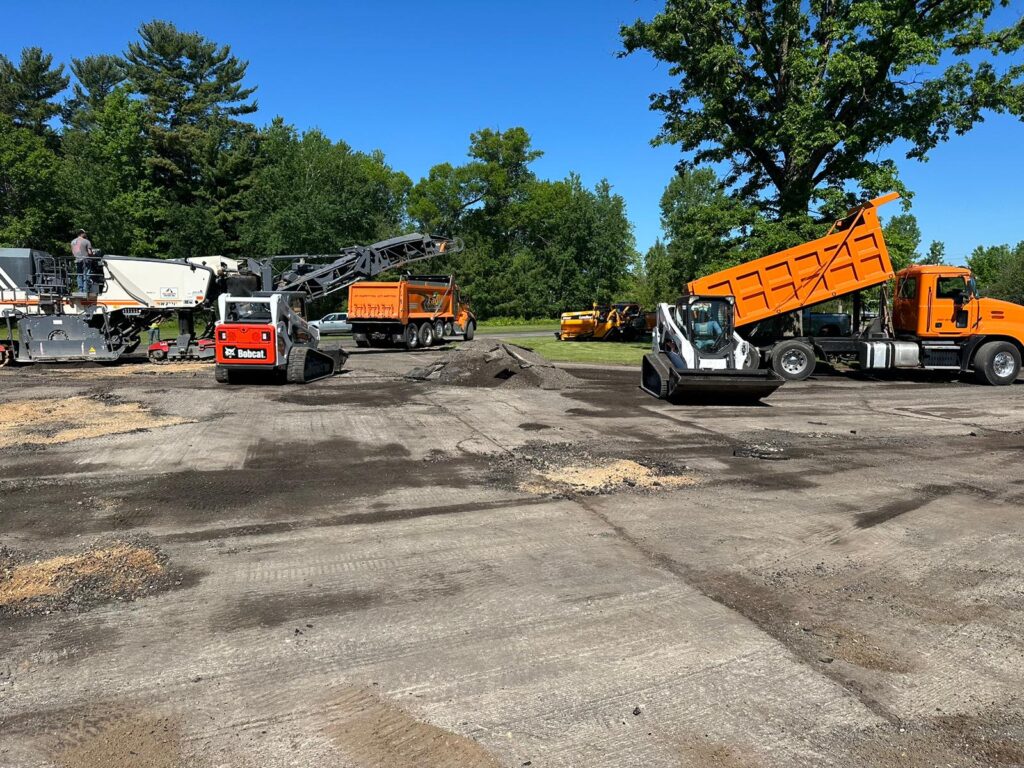- 4721 W. Jennifer Ave. #14 Fresno, CA 93722
Eagle Asphalt specializes in the design, building, and maintenance of roads, highways, and other transportation infrastructure. These services include site preparation, grading, paving, drainage systems installation, and marking.
Site preparation involves clearing and grading the land for the construction of roads. This process includes the removal of trees, rocks, and other debris that may affect the road’s stability. Grading is also done to ensure that the road has a smooth surface and proper drainage.
Paving is another important aspect of road construction services. It involves laying down asphalt or concrete on the prepared surface to create a smooth and durable driving surface. The thickness of the pavement layer depends on the expected traffic volume and the type of vehicles that will use the road.
Drainage systems installation is also a crucial part of road construction services. Proper drainage prevents water from accumulating on the road surface, which can cause damage to the pavement and create hazardous driving conditions. Drainage systems include culverts, gutters, storm drains, and retention ponds. Finally, marking is done to provide clear guidance to drivers on the road. This includes painting lines and symbols on the pavement to indicate lanes, turn lanes, crosswalks, and other important information. In conclusion, road construction services are essential for creating safe and efficient transportation infrastructure. They involve a range of activities from site preparation to marking that require careful planning and execution.
In addition to drainage and marking, road construction involves several other essential steps to create durable, long-lasting, and safe roads. Site preparation is often the first phase, which includes clearing and grading the land to create a stable foundation. This phase ensures the ground is ready to support the layers of pavement that will be applied. Proper site preparation also addresses any potential soil issues, such as areas that are too soft or unstable to hold up under heavy traffic. Soil stabilization techniques may be used to reinforce the foundation, especially in areas prone to erosion or where soil composition is less ideal.
Following site preparation, the road construction process moves into the layering and compaction stages. Layers of aggregate and other materials are laid down to build a strong base, often called the sub-base, that can support the final pavement layer. Compaction is crucial at this stage to ensure each layer is tightly packed, reducing the likelihood of settling and cracking over time. This compacted base provides a smooth and resilient surface, which is especially important in regions with heavy rainfall or temperature fluctuations, where road surfaces are more prone to cracking and deformation.
Once the base layers are established, the pavement construction phase begins. Pavement typically includes applying asphalt or concrete to form the road’s top layer. The choice of material depends on various factors, such as expected traffic volume, budget, and local climate conditions. Asphalt is often used for its flexibility and ease of repair, while concrete offers a more rigid, long-lasting surface. Each material has its unique advantages, and construction teams carefully select the best option for each project.
After the pavement is in place, a range of finishing tasks is completed to ensure the road meets safety and quality standards. This includes marking and signage to guide drivers and alert them to important information, such as speed limits, merging lanes, and pedestrian crossings. Proper signage is essential for preventing accidents and maintaining smooth traffic flow.
Finally, ongoing maintenance is a critical component of road construction services. Even the best-built roads require routine upkeep to handle the wear and tear from traffic, weather, and other environmental factors. This maintenance may include sealing cracks, repaving damaged sections, or updating road markings to maintain visibility. By investing in high-quality road in construction practices and proactive maintenance, we help ensure that the roads are safe, durable, and able to meet the needs of modern transportation.




